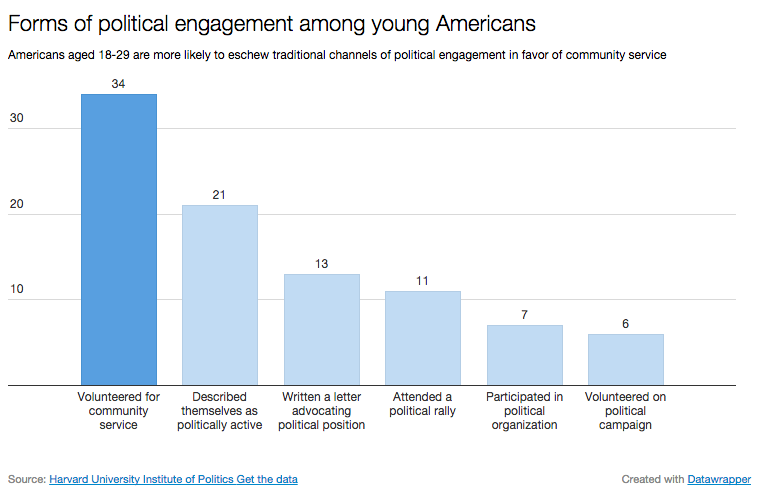It’s official: Young people are opting out of American politics.
That’s the conclusion of the Harvard University Institute of Politics’ annual poll of young people’s attitudes toward political and public service. The survey of 3,034 Americans between the ages of 18 and 29 confirms what previous examinations of Millennial politics have shown: Young people are continuing to decline to participate in a modern American political system they see as ineffective.
The report shows a lack of political engagement through traditional avenues. Only seven percent of young people say they’ve participated in a government, political, or issue-related organization, while 13 percent report they’ve written a letter advocating a political position. Meanwhile, 11 percent claim to have attended a political rally, and a mere six percent say they’ve volunteered on political campaigns. And while a somewhat encouraging 21 percent say that they’re “politically engaged,” it’s not exactly the rosy picture of the youth bloc mobilized by President Obama during his historic 2008 election campaign.
More than ever, young people are becoming single-issue citizens; a deviation by a candidate on just one issue can push entire swaths of young voters away.
But just because young people are opting out of politics doesn’t mean they’re entitled brats mooching off of their parents, as seemingly every op-ed columnist in the world would have you believe. About 34 percent of young people say they volunteered for some sort of community service in the last 12 months. Coupled with the percentage of people who are politically engaged (which, while low, stands higher than those participating in traditional political action), it suggests that young people are still focused on giving back to their communities and society, but simply don’t see conventional politics as the right way to do so substantively.

Given that more more young people surveyed by Harvard identified as Independents rather than Republicans or Democrats, this fits with the trend of Millennials as unmoored by traditional political and religious institutions. With Congress seized by gridlock and elections ravaged by horrifying political discourse, young Americans are embracing volunteering over voting more than any prior generation.
That young Americans remain focused on civic activities may seem heartening, but there’s a potential dark side revealed by the IOP data. More than ever, young people are becoming single-issue citizens; a deviation by a candidate on just one issue can push entire swaths of young voters away. Some 69 percent of respondents said they would at least consider voting against someone with differing views on abortion; 74 percent said the same for tax policy, 63 percent for same-sex marriage, 63 percent on big banks and Wall Street, and so on.

This points to a balkanization of Millennial politics. Sure, young people are engaging in communities that matter to them (especially religious ones), but they’re politically inflexible when it comes to broader national issues. In the cases of same-sex marriage or racial inequality, young people are basically on the right side of history, but complicated policy questions have been essentially reduced to ideological sacred cows, immune from critique and absolutely inviolable.
This attitude didn’t start with young people—arguably no generation has contributed to ideological narcissism more than the Baby Boomers—but the rise of social media has crystallized our political and social activities as matters of identity, not just current affairs. It’s no wonder that Congress has become increasingly polarized over the last 60 years: When it comes to certain policy stances, it’s all or nothing with the electorate come November.
It’s unclear how these dual elements of increased civic engagement and sacred policy areas will shape politics as Millennials overtake Baby Boomers this year. But regardless of when the Millennial generation comes into its own as a political force, you certainly won’t see apathy and cynicism from the young people making your community a better place.




